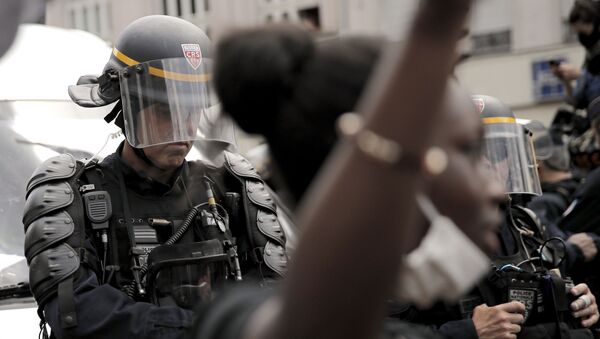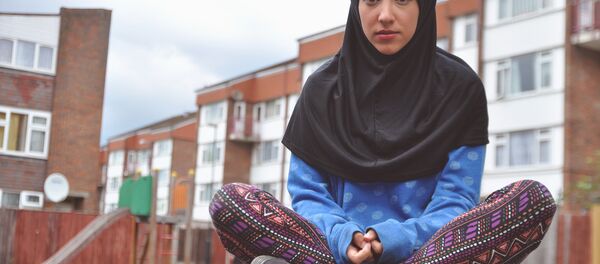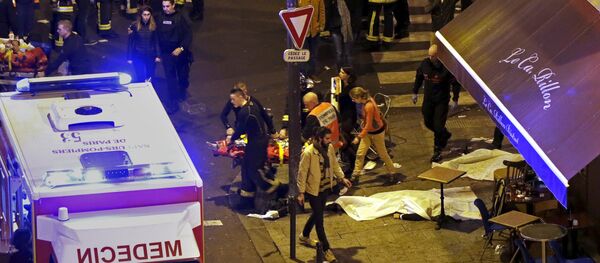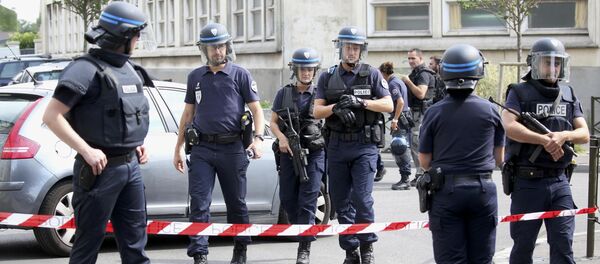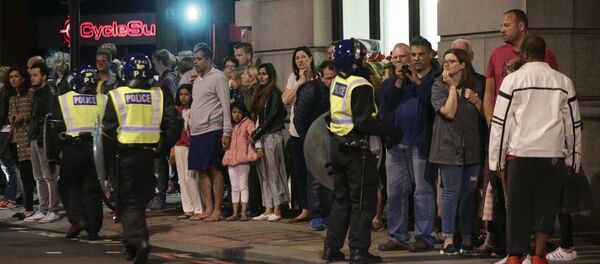Gamal Abina is a French citizen of Algerian descent. Mr Abina has been campaigning on anti-racist issues for nearly 20 years and co-founded the MDC (Civil Rights Movement). He argues that simply blaming ideologies, such as Wahhabist Islam, for acts of politically motivated violence in France is simplistic and ignores the history of France's colonialism, imperialism and marginalisation of ethnic minority communities.
Sputnik: Describe the situation in France since the last acts of politically motivated violence.
Gamal Abina: To begin with, I would say that the situation in France for a number of years, with the multiplication of economic and social crises, has continued to deteriorate.
Between the problems of national identity, the forfeiture of nationality, the excessively security-focused discourse, the demonstrations of the Yellow Vests and the arrival of COVID-19, the general atmosphere is very bad. And now, with the return of the attacks, the increase in tensions has become palpable in daily life. Here and there we observe racist slippages and gestures of discontent on the part of French people from Europe in the face of French people from postcolonial and especially North African immigration.
But although most of the Islamic violence is claimed for reasons related to the cartoons of the Prophet and France's international policy in the Middle East, the mainstream French media continue to pretend that these issues are not related, and that France is undergoing inexplicable terrorist attacks.
Although not necessarily insane, these assassins continue to be perceived as such by secular dogmatists in France [who ignore any political motivation they may have for their acts of terror].
Sputnik: How has the French state reacted to such attacks in recent years?
Gamal Abina: The arrival of Mr Macron to power in 2017 had calmed tensions. It is undeniable that this young president has no colonialist tradition and is obviously not racist.
During the first two years of his mandate he has systematically reduced if not limited the offensive political positioning of France vis-à-vis Islam and Islamism.
For two years, the question of Islamophobia had been reduced as a skin of sorrow, unfortunately with the arrival of an adviser [the former centre-right President] Nicolas Sarkozy, Macron's political positioning with the social tensions began to evolve by taking up again the good old methods of scapegoating. It doesn't eat bread to hit the minority, to point the finger at them in order to divert attention from the real, insoluble issues.
Initially, the Right was very offensive on issues of Islam, street prayers, community meals, veiled women, mixed swimming pools, but the Macron government appeased minorities with unprecedented levels of openness.
Today, the management of North African minorities and of their religious traditions has become tense again, the secular discourse is asserting itself more than ever, and the media offensive is relaunched as never before.
It has thus become a more repressive management and much less open than at the beginning of his mandate.
The general feeling is that France has once again become caught up in an offensive and warlike discourse with a reinforced repressive component, but above all with the idea that the country is at war and that all means are good to reduce this ill-defined enemy.
Between the wars against the virus and the war against terrorism one has the feeling that we have returned in 2001 after [the] September 11 [terrorist attacks in the US].
Sputnik: To what extent have the French government's policies in response to these attacks improved or worsened the situation?
Gamal Abina: The political and media response, and more particularly the emotional reactions of the leaders, seem to me to be extremely damaging for the country.
Indeed, despite the horror of the murders that have followed one another since 2015, French political leaders do not take the necessary distance to provide an appropriate response but tend to ride the legitimate emotional wave of a population on edge.
The direct consequence is the feeling of a powerless policy that limits itself to deploying repressive forces in the face of a ghostly enemy, a disembodied enemy called terrorism.
Instead of privileging prevention and education, but above all the reduction of tensions, the state engages in an asymmetrical war that is bound to have unfortunate consequences for innocent people.
Since the intelligence services are not able to foresee an isolated act, a lone wolf is trying to strike visible Muslim organizations and NGOs to set an example and give the feeling that security will be restored.
In 2015, after the attacks on the Bataclan, the death of more than 300 innocent civilians, the state had deployed the entire police system in all territories in order to make 3000 more or less targeted arrests that ultimately yielded nothing.
Here again, the general feeling is that the state is chronically unable to solve the problem and is obliged to call on the population as a substitute relay to the police.
You can imagine the excesses that this will lead to.
Worse still, the media class claims to be defending a private-interest newspaper by claiming the right to freedom of expression which is guaranteed by law but above all the right to blasphemy which does not exist in the texts. Here again, there is no questioning of the coarse and insulting drawings that are presented as harmless and legitimate caricatures. The media prefers to privilege the independent, intellectual and free character in its artistic expression of a France that will never capitulate in the face of terrorism.
President Macron, in a poorly mastered speech, also spoke out in defence of the Charlie Hebdo cartoons.
Here again, the consequences were disastrous since Muslim countries felt insulted in turn and decreed a boycott of French products on their territories.
With the increase in tensions, the President of the Republic had to speak on Qatar's Al Jazeera television channel to explain that he was not at all against Muslims or Islam; a way of bridging the divide that will not convince many.
Of course, the business probably did not appreciate the risk of losing turnover in the midst of a global pandemic.
Sputnik: Does France need stricter legislation to deal with politically motivated violence?
Gamal Abina: It is obvious that France does not need stricter legislation since the repressive aspect is extremely heavy. Today, the guarantee of individual liberties, but above all of freedom of expression and secularism, are enshrined in law.
Acts of violence are heavily punished, especially when it involves the death of a person, and the general atmosphere of denunciation increases the pressure even more on those who would like to deviate from the right path.
On the other hand, to highlight the political nature of this violence, it should be recalled that France is nevertheless at war in several theatres of operation abroad: Libya for its geographical proximity, Mali, Syria where it still has men present on the ground.
Its rivalry with Turkey is obvious and the tensions that will increase with the defeat of General Haftar at the hands of Turkish support from the forces in Tripoli are not unrelated to this. In addition to this, there are other tensions in the Caucasus with the question of Nagorno-Karabakh disputed by Armenia, for which France provides unfailing support at the parliamentary level. The question of Cyprus also remains unresolved and the desire to reduce Turkish influence in the Arab-Muslim world largely explains the opening of hotbeds of tension with Muslims in France and Turkish Muslims, particularly today.
In my opinion, the only way to deal with the internal violence that the various populations that make up the French nation-state have been suffering for a number of years would be to look its international policy in the eye, to agree to withdraw the troops engaged in all these theatres of operation, but above all to no longer take an offensive stance on the issue of Charlie Hebdo's cartoons by taking a much less partisan attitude and reminding people that when the cartoon passes the insult stage, anger at those who feel insulted must be heard. I'm used to saying that Muslims in France are mostly people of immigrant background whose parents could not read and write; they have no support from their country of origin but, above all, they are a constellation of unorganized communities unable to defend themselves and respond with a single voice in the face of violent or problematic political action. It is easy to beat up weak people who have no elected representatives, no decision-making bodies and virtually no access to mainstream media to respond to their critics.
In order for things to go better, as under [former French President] Jacques Chirac's term, who I remind you did not experience any terrorist attacks during his 12 years in office, one must be able to discuss with one's detractors or opponents to rebalance one's position in order to find solutions that bring points of view closer together.
Without this essential channel of communication and especially without the disengagement of French troops who too often intervene in countries where they are neither invited nor mandated, the question of terrorism and violent responses can never be resolved. It is obvious that communication has been broken for a very long time and that unfortunately radicals from all sides have been grafted on to this, systematically pushing their advantage towards a generalised confrontation.
I would say that one never enjoys war with one's friends and that it is time to think about making peace with one's enemies.
Sputnik: Some argue that the root cause of these politically motivated acts of violence in France lies in a form of extreme Wahhabist Islam. Do you agree?
Gamal Abina: Arguing that political violence in France is the consequence of Wahhabist Islam or a political Islam that is allegedly teleguided by the Muslim Brotherhood of Qatar or Turkey or the UOIF of Morocco is a fanciful and simplistic explanation.
To begin with, Wahhabism is an ideology coming from the lands of Arabia spread throughout the world with the support of petrodollars and a laissez faire of the West that I find suspicious but which is originally explained by the Cold War and the objective of Western governments to bring down the Soviet bloc.
The Wahhabist doctrine is characterised by the fact that it is necessary to return to the sources of Islam as perceived by Mohamed Abdelwahab and one of the fundamental elements of which is to say that we must not question the political power that rules the country that God has imposed on us. In substance, the questioning of the royal power is not possible, the objective being rather to spread a rigorous reading of an Islam 'purified of deviances'. Wahhabism promotes a literalist practice that is not part of a political struggle, somewhere its practitioners are the Amish of the Muslim world.
This is a notable difference with the Muslim Brotherhood who created their political struggle on the questioning of power but especially on the diffusion of Islam as perceived by the idea of the Caliphate.
The other political Islam following the Islamic revolution in Iran had the same ambition, but the Shia characteristics of this minority current of Islam make it a movement much less followed by the Maghrebians in France.
One cannot rule out the fact that Wahhabi ideas, particularly in the 1990s and the early 2000s, had an influence on the religious practice of the French Muslim minority. But the absence of political demands from this movement cannot explain the increase in the radical positions of a population that feels marginalised from French society and who are considered as an inferior class with an inferior religion, and that therefore suffers from systemic racism that does not want to say its name.
Most Arab Muslims in France have a widespread feeling that they will always be excluded from French society, excluded from studies, work, housing and even political life. This feeling is coupled with a perfectly legitimate anger, when for more than 40 years they have been observing anti-Muslim propaganda in the mainstream media that has rarely ceased to be practiced. With each conflict in North Africa or the Middle East, this question about Islam and the idea that there would be enemies from within the national territory is always revisited. The rise in power of the extreme Right combined with the increasingly extreme discourse of the classical Right with the Left, which recovers some ideas born in the minds of the founders of the National Front Jean-Marie Le Pen, give a perfectly understandable general feeling that the Arabs of France and religion are not part of the values of the Republic. The country of the Enlightenment readily forgets that their Enlightenment was born in the East like the three monotheistic religions.
This is combined with frustration, the denial of war crimes committed by colonisation, which is hardly taught in schools and for which the French Republic still refuses to acknowledge its responsibilities or ask for forgiveness.
This is why reducing the idea of political violence to a simple ideological current coming from Arabia seems to me to be extremely simplistic, reductive but above all allows us to avoid the responsibility of the French State, the system of exclusion and the feeling of insecurity that is constantly maintained in the media with regard to North Africa and Islam.
One only has to look at all the attempts of the legislator to change the laws against the interests of these French people said to be of immigrant origin to realise this. Whether it is the questions of national identity, forfeiture of nationality or even more recently separatism that only exist in the minds of political decision-makers, to satisfy low electoral calculations, the Maghreb population is not fooled by what is happening and understands perfectly well that it is becoming a priority target for politicians whatever their political tendency.
The responses and reactions to the Danish cartoons and those published in Charlie Hebdo should be seen within this context. Here again, it is a population that feels abandoned and incapable of providing an intellectual or media response to this obsessive offensive against the values of Islam and its most respected figure who bore its values (ie the prophet) by giving it a general feeling of injustice, contempt and humiliation.
If you add to this the chronic fragility, in which most North Africans are economically, structurally and politically, the only means of expression left to them is the inscription in a cult moment of identity claims.
Sputnik: What should the French government do to reduce, if not eliminate, politically motivated acts of violence committed by non-state actors?
Gamal Abina: French suburbs produce the social exclusion supported by the former [leader of the Socialist Party and] President of the Republic François Mitterrand. Since the 1980s we have seen the deliberate concentration of people with the same ancestry, such as Algeria, within schools whose level is one of the lowest in Europe. But above all the school segregation imposed by [former French Prime Minister and Minister of Education] Lionel Jospin followed by the geographical segregation imposed by local government commissions and finally the exclusion from the world of work imposed by certain openly racist decision-makers or those who have developed racist "reflexes".
This way of manufacturing ethnically segregated areas, abandoned by the Republic, has led to the manufacture of monsters who believe that they have nothing left to lose and who do not hesitate to sacrifice themselves with an explosive belt in front of the Stade de France.
Often, it is young people under the age of 25 soaked in Internet and media propaganda, idle and without a future, who end up taking action in the hope of one day being received in God's paradise, since, for them, on Earth it is Hell.
In order to solve these problems we should first start giving strict guidelines to stop propaganda against immigration, Arabs, Muslims and the Arab-Muslim world.
Then it would be necessary to deconstruct the system of "incarceration" that constitutes the French suburbs and to ensure that there is social integration. First through schooling, then through university, then through work and of course housing.
We must ensure that this hopeless youth sees a way out of being condemned to a life of unemployment and social exclusion.
Then, as in Jacques Chirac's time, France should resume a balanced policy with the Arab world and, above all, French forces, that are engaged in wars in which they have no business, should withdraw immediately and allow for settlement through political solutions.
If all of these elements are implemented, it will help to lower tensions, to settle the question of attacks, but above all to get out of a neo-colonial policy of a country that seems to have never ceased this tradition.
Well, obviously, to finish, France would have to finally write its history with lucidity and stop its attempts to rehabilitate colonialism, as we saw with the passage of the 2005 law that required schools to teach the "positive values" and benefits of colonialism (which was ultimately repealed by then French president Jacque Chirac following popular uproar).
Unfortunately, I remain rather pessimistic. When one observes that recently, two 10-year-old children of Turkish origin were taken into custody for allegedly 'defending terrorism'; in the land of the Enlightenment, Egalitarianism and of Human Rights, it would seem that a child of foreign origin is perceived as less human than their 'White' counterparts.

